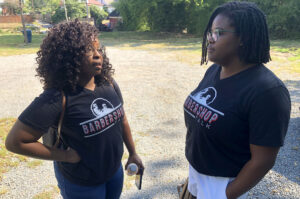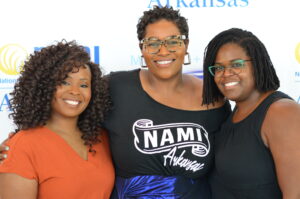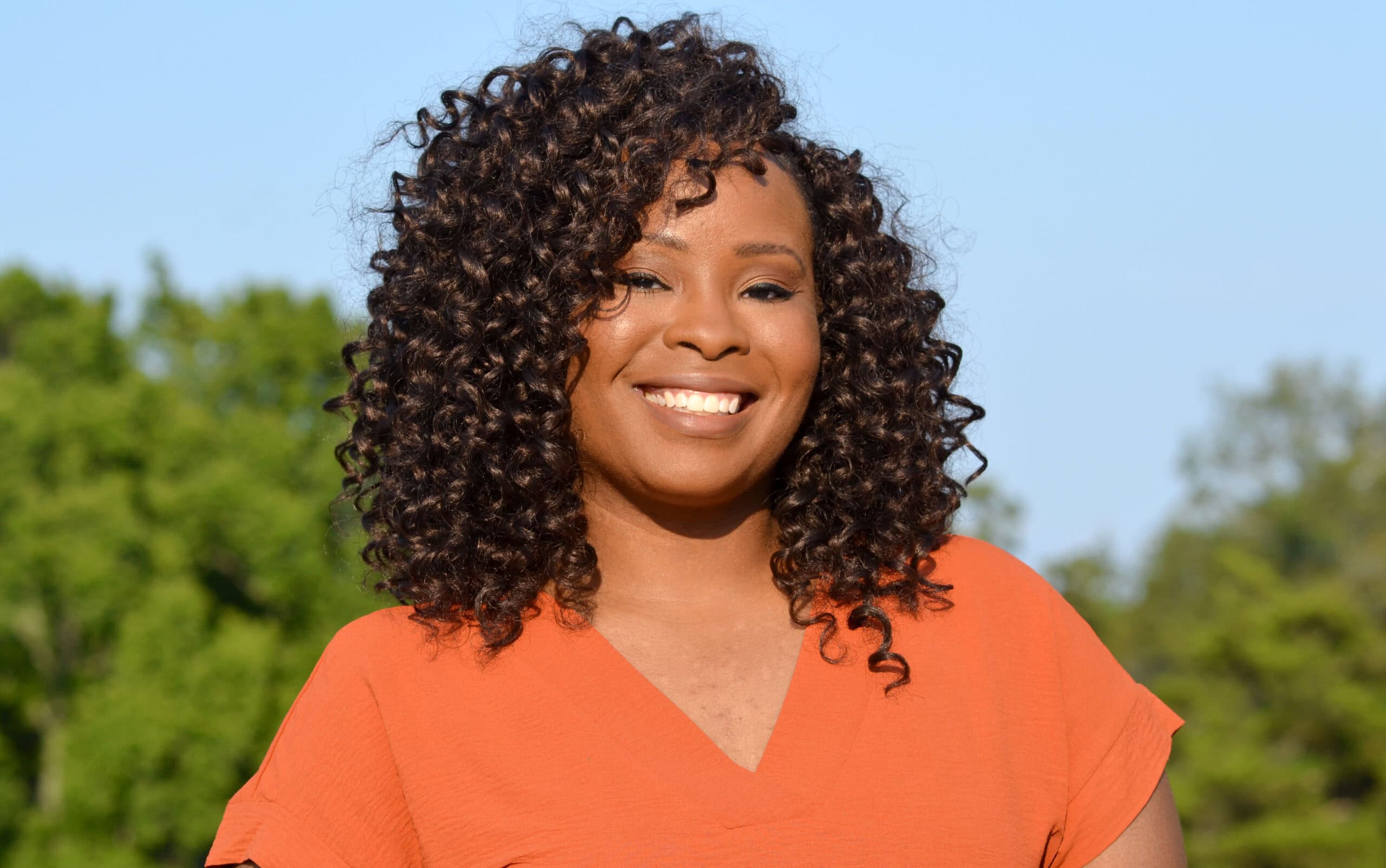Tamier Wells Takes Pride in Being a Source of Hope, Guidance and Happiness
| Tamier Wells, MPH, maintains a selfless outlook on life, regardless of what she’s dealing with.
A clinical research coordinator for the University of Arkansas for Medical Sciences (UAMS) Fay W. Boozman College of Public Health, Wells regularly interacts with the public. Due to being loquacious and having the chance to serve Arkansans, she’s grateful to have the role.
“I love being out in the community,” she said. “I enjoy meeting new people, and I appreciate the opportunity to help my fellow community members.”
The way Wells views her existence relates to her compassion.
“My compassion is why I wanted a career in public health,” she said. “I know — without a doubt — that I was put on this Earth to help people.”
THE EARLY YEARS
Wells hails from a family committed to service.
Her dad is a veteran of the U.S. Armed Forces. She lived in Germany, Kentucky and other regions of the U.S., before her family relocated to northeast Arkansas.
“My parents are from Blytheville,” she said. “I can remember when we were moving to Arkansas, I cried all the way from Kentucky to Blytheville. I did not want to move to Blytheville. Once we got there, the town grew on me. I had a lot of family there.”
She credits Blytheville’s culture for molding her into who she is today.
“I’m down-to-earth country girl,” Wells said. “Blytheville had a big impact on me. I’ve been in Arkansas since 2003, that’s most of my life.”
Wells, a 2006 graduate of Blytheville High School where she was a member of the marching band, remained in Arkansas for college. She went three hours away to Conway and attended the University of Central Arkansas (UCA).
Wells flourished as a college student, building several beneficial friendships in the process. Perhaps none of those relationships remain as dear to Wells as the ones she created through Zeta Phi Beta Sorority, Inc. While at UCA, she joined the sorority’s Gamma Eta chapter.
Founded in 1920, Zeta Phi Beta adheres the pillars of true service, scholarship, sisterly love and finer womanhood.
“Zeta was my family away from my actual family in Blytheville,” Wells said. “I wanted to be a part of something bigger than me. I wanted to be a part of something that gave me a chance to be difference maker, serving the community.
“I challenge myself to uphold that standard of finer womanhood. That’s part of why I’m so serious about helping people who need assistance.”
In addition to her sorority, Wells was also active on campus with the Society for the Unification of African American Women and the UCA Circle K International.
Of course, she also took care of business academically, earning a bachelor’s degree in health services administration in 2011. Following graduation, Wells would ultimately come to work at UAMS.
HEALTH PROFESSIONAL
Wells desired a career that would allow her to help people.
Eventually, she began working in the College of Public Health’s Department of Epidemiology. The position gave her an unexpected opportunity to develop a better understanding of public health.
“I didn’t know about public health until I attended a recruiting event at UCA, as an undergrad student,” she said. “A member of the College of Public Health Office of Student and Alumni Affairs staff told me about public health and health administration. However, while working in the epidemiology department, I learned more about the field. That’s when I realized that I didn’t want to go into health administration.
“I’m a talker. I wanted to be out in the community, meeting people and giving them the help they need.”
Not long after starting her employment with UAMS in 2013, Wells enrolled in the school’s Master of Public Health program.
“I knew a public health career would give me the chance to interact with, and help, an entire population of people all at one time,” she said.
Wells has fond memories of her time as a student in the college.
“I met a lot of awesome people who connected me to great opportunities,” she said. “Attending the college was the right move for me. The College of Public Health is a great school.”
Wells completed the MPH program in 2016. She made it a point to once again seek employment in the college. Eventually, a prime opportunity developed in the school’s Department of Health Behavior and Health Education, and Wells seized it. She began working for the department, where she helps administer the Barbershop Talk project. The program educates Black men on ways to avoid using alcohol to cope with stress.

Tamier Wells (left), MPH, enjoys a conversation with her colleague Camille Hart, MPH, following a media appearance in which they spoke about the Barbershop Talk program and how it makes a positive impact in Arkansas.
“I’m helping Arkansans, especially African Americans, because a lot of people struggle with the proper way of handling stress,” Wells said. “If we give people a space to openly talk, free of judgment, that will help them. Also, we give participants of the program access to resources. The resources can open the door for them to get the assistance they need.”
Wells says she feels personally connected to both the program, and its clients.
“I speak to the Barbershop Talk participants like they’re a longtime friend,” Wells said. “I let them know that I love and care about people. I want to see everyone healthy.
“I do this work for my people. I want Arkansans to be healthier.”
As a largely rural state, many Arkansans don’t have access to health care in their communities.
“Blytheville has a hospital, but people still have to travel Jonesboro, Memphis or Little Rock to get the specialty care,” she said. “That’s a problem because some of the people in my hometown, and the surrounding areas, don’t have a ride to get to Memphis or Jonesboro. That’s why it’s important that we as health care professionals present information about resources to the community.
“If we consistently put the info out there where people can get it and understand it, we’re helping to solve some of the access to care issues, which leads to improved health.”
LOVING DAUGHTER
Wells’ servant heart is also evident at home.
“My mother had an air embolism, which caused her to have a stroke that left her unable to fully move,” Wells said, so now one of her biggest priorities is helping her mother.
“I never would’ve thought I’d be dealing with this at age 36 — taking care of my mom,” she said. “However, my sister and I have a routine in which we use to care for her. That helps a lot.”
When asked what is like having to help her mom, Wells had a candid response.
“She’s still mom,” she said. “She has her full mental capacity. She just can’t move. In fact, she’ll still get on us. She’ll tell us what she’s unhappy about, if there’s something that she doesn’t like, just as she always has.”
The caretaking duties can be tedious, and Wells has a situation herself that she must be cautious of. However, she serves the community with vigor — and she vows to do the same within her household no matter how she feels.
“I just find a way and push through it all,” Wells said. “Sometimes I’m in pain myself. But I must help take care of my mom.”
LIFE WITH LUPUS
In 2020 during the COVID-19 pandemic, Wells began to have body pains. She didn’t have COVID, but she couldn’t figure out why she was always in discomfort and fatigued.
“It was scary,” Wells said. “I knew it wasn’t COVID, but I knew something wasn’t right. I was not feeling normal.”
Her mother reminded her that lupus runs in their family.
Lupus is a disease in which the body’s immune system attacks its own tissues and organs. Lupus can create inflammation that causes pain in a person’s joints, skin, lungs, kidneys, heart and other areas.
Tired of seeing her daughter in pain, Wells’ mom told her to ask the doctor to perform a lupus test.
Wells listened to her mother and told the doctor about other members of her family having lupus.

Tamier Wells (left), MPH, is a clinical research coordinator for the University of Arkansas for Medical Sciences (UAMS) Fay W. Boozman College of Public Health. While attending a community event, Wells poses for a photo with Tiffany Haynes (middle), Ph.D., associate professor in the college’s Department of Health Behavior and Health Education and Camille Hart (right), MPH, research program director in the department.
“I initially went to the doctor twice about how I was feeling, and both times he told me that I didn’t have lupus,” she said. “When I requested a lupus test, the physician discovered that I have lupus.
“It was a relief to find out I had lupus. I was still scared because I didn’t know much about the condition. But at least I knew what was wrong with me.”
While Wells was happy to find out what was wrong, she was less thrilled to have experienced an ongoing public health issue: the disconnect between medical professionals and Black people.
“I’ve lived to be yet another example of how in the Black community, we can too often tell our doctor what’s going on with our body, and they’ll still tell us we’re fine — even when we know we’re not,” she said. “Unfortunately, there are health providers who will marginalize a Black person and not listen to us. Through my ordeal, I learned that we must be comfortable with advocating for ourselves.”
Wells now sees a lupus specialist. She also pays close attention to her body and how she feels.
“I make it a point not to stress out or overextend myself,” Wells said. “Knowing when to stop and relax to deal with lupus is important. You must know what your body can do and what it’s not capable of doing. Your body will tell you it’s time to sit down — before it shuts you down.”
Despite her difficulties, Wells believes it is important to always serve others.
“Being from a military family, I understand the importance of having respect for people and having compassion for the plight of others,” she said. “I learned that if you see someone who needs help — try to help them.”
